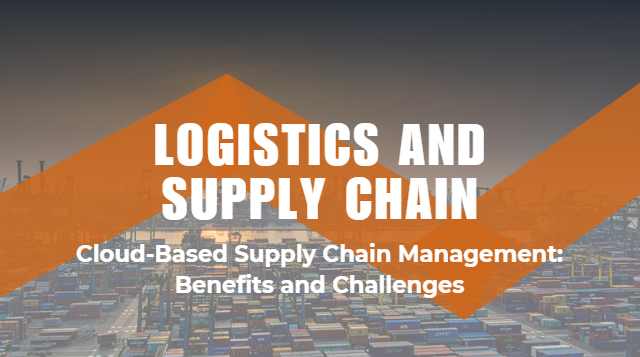
In order to enhance their supply chain operations in the fast-paced commercial world of today, firms are increasingly using cloud-based technologies. Cloud-based supply chain management (SCM) has emerged as a game changer, allowing firms to streamline procedures, boost visibility, and collaborate more effectively. In addition to discussing the advantages and difficulties of cloud-based supply chain management, this article also discusses how professionals can improve their skills by enrolling in online courses and earning a diploma in supply chain management.
What are the benefits of Cloud-based supply chain managmenet?
1. Enhanced Visibility and Real-Time Tracking
The capacity to manage and monitor supply chain activity in real-time is one of the biggest benefits of cloud-based SCM. Organizations can have complete access over their inventories, shipments, and supplier performance. This level of openness enables proactive decision-making and reduces the risks associated with delays and disruptions.
2. Cost Efficiency
Cloud-based supply chain solutions save capital costs by doing away with the requirement for pricey on-premise infrastructure. Businesses can choose scalable subscription models, paying only for the services they require. This cost-effective method enables both small and large businesses to benefit from superior SCM capabilities without making substantial financial investments.
3. Improved Collaboration and Communication
Cloud technology makes it easy for manufacturers, distributors, suppliers, and customers to access and share information. Cloud platforms provide real-time connectivity, minimizing bottlenecks and increasing efficiency throughout the supply chain. Many professionals who want to better grasp these dynamics participate in Logistics and Supply Chain Management Courses Online to obtain hands-on experience with cloud-based collaboration technologies.
4. Scalability and Flexibility
The scalability of cloud-based solutions is unparalleled in contrast to traditional SCM systems. Businesses may simply change their supply chain processes in response to demand swings. Whether scaling up during busy seasons or optimizing operations during off-peak periods, cloud technology gives the flexibility required to adjust quickly.
5. Advanced Data Analytics and AI Integration
Demand forecasting, process automation, and predictive analytics are all made possible by cloud-based supply chain management solutions that make use of artificial intelligence (AI) and machine learning (ML). These data enable organizations to forecast market trends, decrease waste, and improve inventory management. Professionals seeking to specialize in data-driven decision-making might consider pursuing a PG Diploma in Logistics and Supply Chain Management to hone their analytical skills.
6. Enhanced Security and Compliance
Multi-factor authentication, encryption, and frequent security upgrades are just a few of the strong security features that cloud service providers give. These measures ensure that sensitive supply chain data is safeguarded against cyber attacks. Cloud solutions also help firms comply with industry laws by keeping safe and auditable documents.
What Are the Challenges of Cloud-Based Supply Chain Management?
1. Data Security and Privacy Concerns
Businesses continue to worry about the possibility of data leaks and cyberattacks in spite of improved security measures. Supply chain data is a valuable asset, and unauthorized access can cause financial and reputational harm. Companies must invest in cybersecurity training and stringent access restrictions to mitigate these dangers.
2. Integration with Legacy Systems
Many businesses still use antiquated supply chain systems, which makes integrating cloud solutions difficult. Migrating data and maintaining smooth compatibility between old and new systems necessitate meticulous planning and effort. Professionals seeking expertise in cloud integration can benefit from an Online Supply Chain Management program to help them overcome the knowledge gap.
3. Dependence on Internet Connectivity
Cloud-based supply chain management is highly dependent on reliable internet access. Any disruption in internet connectivity might result in communication failures and operational delays. Businesses operating in areas with unstable internet infrastructure must have backup plans in place to avoid downtime.
4. Resistance to Change
When implementing cloud-based supply chain solutions, personnel used to old methods frequently oppose the change. Change management measures, including training programs and leadership assistance, are critical for successful adoption. Many professionals pursue a PGDM in Logistics and Supply Chain Management to study the best practices for digital transformation and change management.
5. Compliance and Regulatory Challenges
Regulations governing the handling and storage of data differ by industry and geographical area. Companies must guarantee that their cloud service providers follow industry-specific rules. Enrolling in a Post Graduate Diploma Logistics course might help you understand regulatory compliance in supply chain management.
How does education influence the adoption of cloud-based SCM?
Professionals must keep up with the newest developments in cloud-based supply chain management as it continues to improve. Individuals who complete educational programs such as a PG Diploma in Logistics are more equipped to negotiate the complexity of modern supply networks.
Upskilling has become easier for working professionals because of online learning. Institutions that provide Online SCM courses offer flexible learning choices, allowing students to receive industry-relevant information without affecting their work. These courses address important topics including cloud computing, AI in supply chain management, and data analytics.
Conclusion
Supply chain management with cloud computing offers a revolutionary method of streamlining operations and logistics. While technology provides various advantages, such as cost savings, real-time visibility, and improved collaboration, enterprises must also overcome security threats and integration obstacles. Online supply chain management programs and certifications can help professionals who want to succeed in this fast-paced industry advance their knowledge. Businesses and professionals can maximize the benefits of cloud-based supply chain management by embracing continual learning and technology developments.



